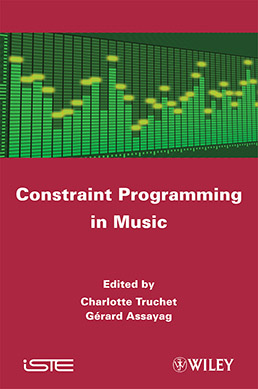
Constraint Programming (CP) is a declarative programming paradigm with many academic and industrial applications (from n-queens to planning, vehicle routing, optimization, and other fields). Since the earliest works on automatic harmonization, Music Composition has been one of these applications, and a very special and challenging one due to its artistic (highly subjective) nature.
The early works on Constraint Programming (CP) in music were limited to classical music composition, as the harmonization and counterpoint rules naturally translate into constraints. Then contemporary composers began to be interested in constraints, and CP has now become an essential element in the toolbox offered by Computer-Assisted Composition systems.
Several contemporary musical pieces have now been composed “with constraints”, but it is reasonable to ask why CP applies so naturally to music, and what are the particular features of musical problems?
This book presents information about recently developed musical CP systems, from both the scientists’ and composers’ points of view. It will therefore be of interest to all of the following: students and researchers of music technology; composers in the computer music scene; or music software companies, especially those trying to model high level musical behaviors (intelligent arpeggiation/arrangement on synthesizers, Band in a Box software, etc.), including music data mining and music taste engineering for online music delivery.
1. Modeling Temporal Constraints for a System of Interactive Scores, Antoine Allombert, Myriam Desainte-Catherine and Mauricio Toro.
2. Variable Orderings for Solving Musical Constraint SatisfactionProblems, Torsten Anders.
3. Constraints for an Unfolding Time, Georges Bloch and Charlotte Truchet.
4. Global Constraints in Orchestration, Grégoire Carpentier.
5. Using Gecode to Solve Musical Constraint Problems, Serge Lemouton.
6. Concurrent Constraint Models of Music Interaction, Carlos Olarte, Camilo Rueda, Gerardo Sarria, Mauricio Toro and Frank D. Valencia.
7. From Rhythm Rules to Music Rules, Örjan Sandred.
8. OMClouds, a Library for Musical Constraints, Charlotte Truchet.
Charlotte Truchet is Assistant Professor at Nantes University in France. During her PhD, she worked at IRCAM/University of Paris 6 on musical constraints, in collaboration with contemporary composers.
Gérard Assayag is head of the IRCAM-CNRS lab “Sciences and Technologies for Music and Sound” and a co-author of the OpenMusic Computer-Assisted Composition software.